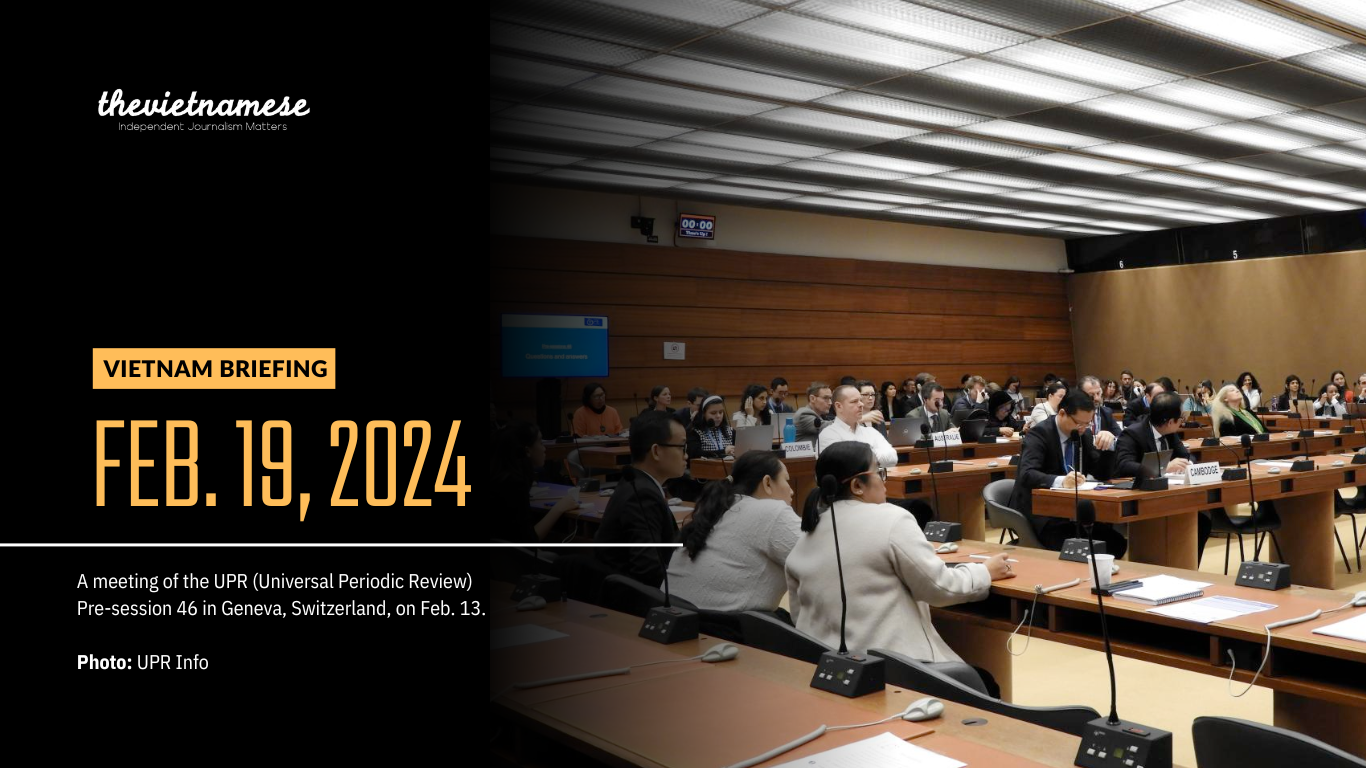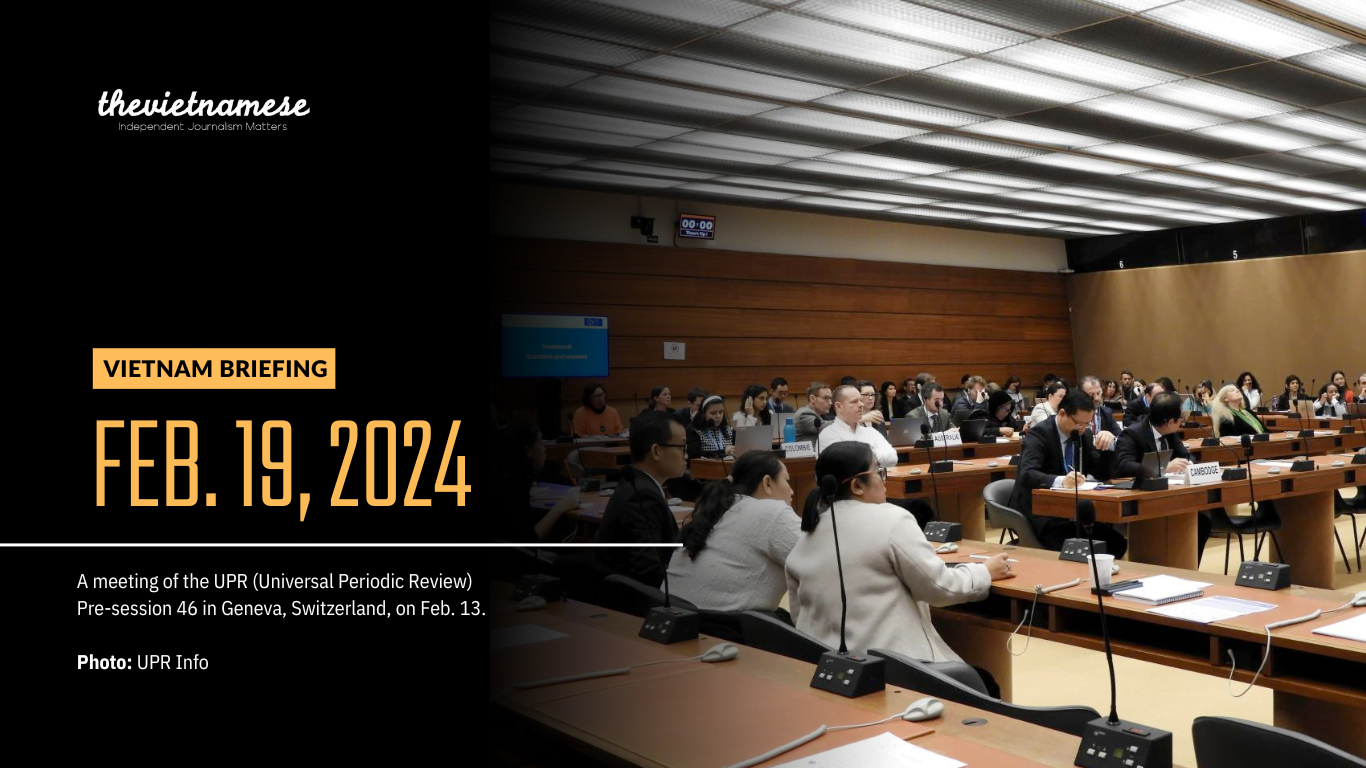Civil Society Groups Propose Recommendations for Vietnam Ahead of Periodic Human Rights Review

Representatives of four non-governmental organizations on Feb. 13 convened in Geneva and presented their proposals and information on the current human rights situation in Vietnam before the country is scheduled to have its fourth cycle Universal Periodic Review in May this year, VOA News reported.
The civil society groups included PEN America and PEN International, the Coalition to Abolish Modern-day Slavery in Asia (CAMSA), Khmer Kampuchea Krom for Human Rights and Development Association (KKK), and Legal Initiatives for Vietnam (LIV) – the publisher of Luat Khoa Magazine and The Vietnamese Magazine.
According to UPR Info, which gathers public recommendations for the UPR Working Groups, these pre-sessions provide human rights groups and civil society organizations a platform where they can inform the representatives of the recommending states about the human rights situation in the country under review. It also offers an opportunity for permanent missions to gather information on the human rights situation in the countries under review, specifically Vietnam in this case.
Speaking at UPR Pre-session 46, PEN America and LIV pointed out the Vietnamese government’s persistent restrictions on civil rights with their continued arrests, convictions, and imprisonment of independent writers and journalists, using vague legal provisions such as “abusing democratic freedoms” and “distributing anti-state propaganda.” LIV also mentioned the increasing repression of internet freedom in Vietnam in the last ten years. At the same time, CAMSA and KKK raised concerns over Vietnam’s failure to deal with the widespread practice of human trafficking, restrictions on religious freedom, and the rights of indigenous people in Vietnam.
These civil society organizations call on the Vietnamese government to amend its laws to protect the freedom of expression, improve living standards, and ensure equality regarding access to education and freedom of religion among indigenous communities in Vietnam.
Vietnam Police Crack Down on Drunken Driving and Critics of Traffic Police
Police in Vietnam’s Lai Chau Province have searched for people who commented on a Facebook posting allegedly insulting traffic police officers on duty on the second day of the Tet holiday, Vietnam’s Lunar New Year. The Lai Chau Police claimed those commenters lacked courtesy and violated the code of conduct while using social media.
On Feb. 13, police in Than Uyen District, Lai Chau Province, said they received a public complaint about a Facebook account named “Linh Nhi” that reportedly posted insulting and defaming content about the police on social media. The police summoned the Facebook user and accused her of taking photos of the provincial traffic police stationed at a highway section in Muong Kim Village, Lai Chau, and publishing them on Facebook to inform the public about their patrolling activities. The police did not release the content of the posting.
Vietnamese traffic police have attempted to crack down on drunken driving recently, especially during the festive Lunar New Year, by increasing police patrols and increasing the fines imposed on violators. Several social media users often document and publish the location of traffic police checkpoints on social media to warn other drivers. However, a jurist from Vietnam informed The Vietnamese Magazine that because the current requirement in Vietnam for the blood alcohol level is at 0% right now, the attempted crack-down has raised many concerns among the public.
Vietnam’s state media reported that 29,000 Vietnamese drivers were fined for drunken driving during the seven-day national holiday, which occurred between Feb. 8 and 14.
The Than Uyen District police have accused the Lai Chau Facebook user of using social networks to “distribute and share false information that distorts, slanders, and insults the reputation of the police agency.” A circular issued in 2019 by the Ministry of Public Security said that Vietnamese citizens are not allowed to publish information and photos of police officers performing public duties on social networks and online groups. Those alleged of violating this regulation could receive a fine of up to 10 million dong ($408).
On Feb. 16, police in southern Vinh Long Province fined a man named N.M.H, 33, a local resident, accusing him of violating Decree 15/2020 by collecting personal information about people and organizations without their consent. Previously, on Jan. 30, the Vinh Long resident reportedly posted the location of a police drunken driving checkpoint on his Facebook account to warn other drivers to avoid passing through this route.
Vietnamese Man Arrested for Burning National Flag
A man in Vinh Long City, Vinh Long Province, was arrested after he was found shredding and setting fire to Vietnam’s national flag during the Lunar New Year. The Vinh Long Provincial Police detained Nguyen Hoang Hung, 40, to investigate his alleged act of “insulting the national flag.”
Vietnam’s state media reported that on Feb. 14, Hung went to February 3 Street, located in Vinh Long City, and pulled down a Vietnamese flag that was hanging on a flagpole and tore it. He then brought the torn flag to Ngo Quyen Street and set it on fire.
After that, Hung allegedly went to a nearby house, where he tore down another flag and used a lighter to burn it. According to news reports, the police said they caught Hung red-handed and arrested him. The Vinh Long man is said to have confessed to his actions. Previously, in January, police in Ba Ria City, Ba Ria-Vung Tau Province, arrested another man who was found burning Vietnam’s national flag and who posted a video recording his action on social media.
Article 351 of Vietnam’s 2015 Penal Code stipulates that those convicted of the crime of insulting the country’s national flag, national emblem, and national anthem could face non-custodial reform or up to three years of imprisonment.

